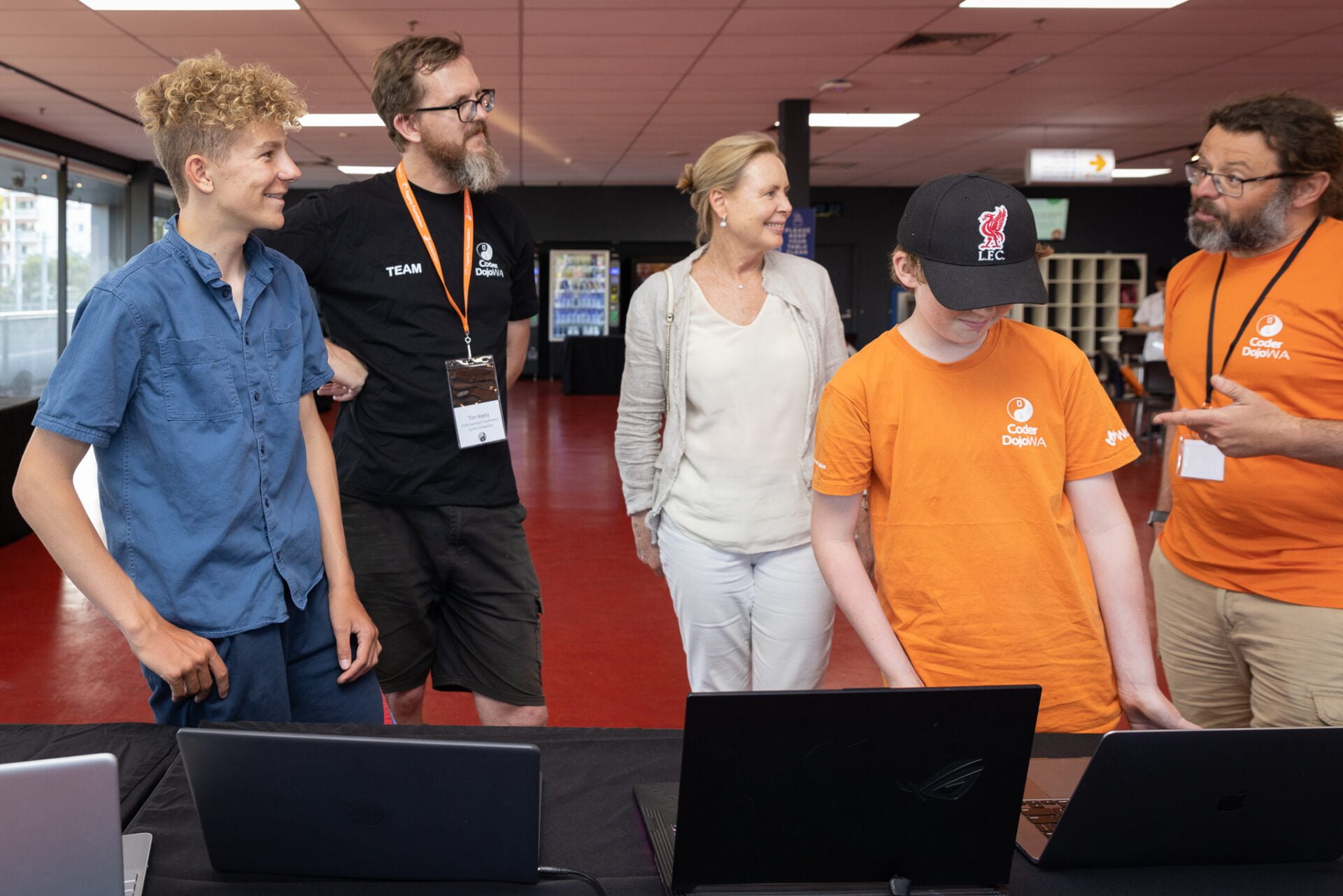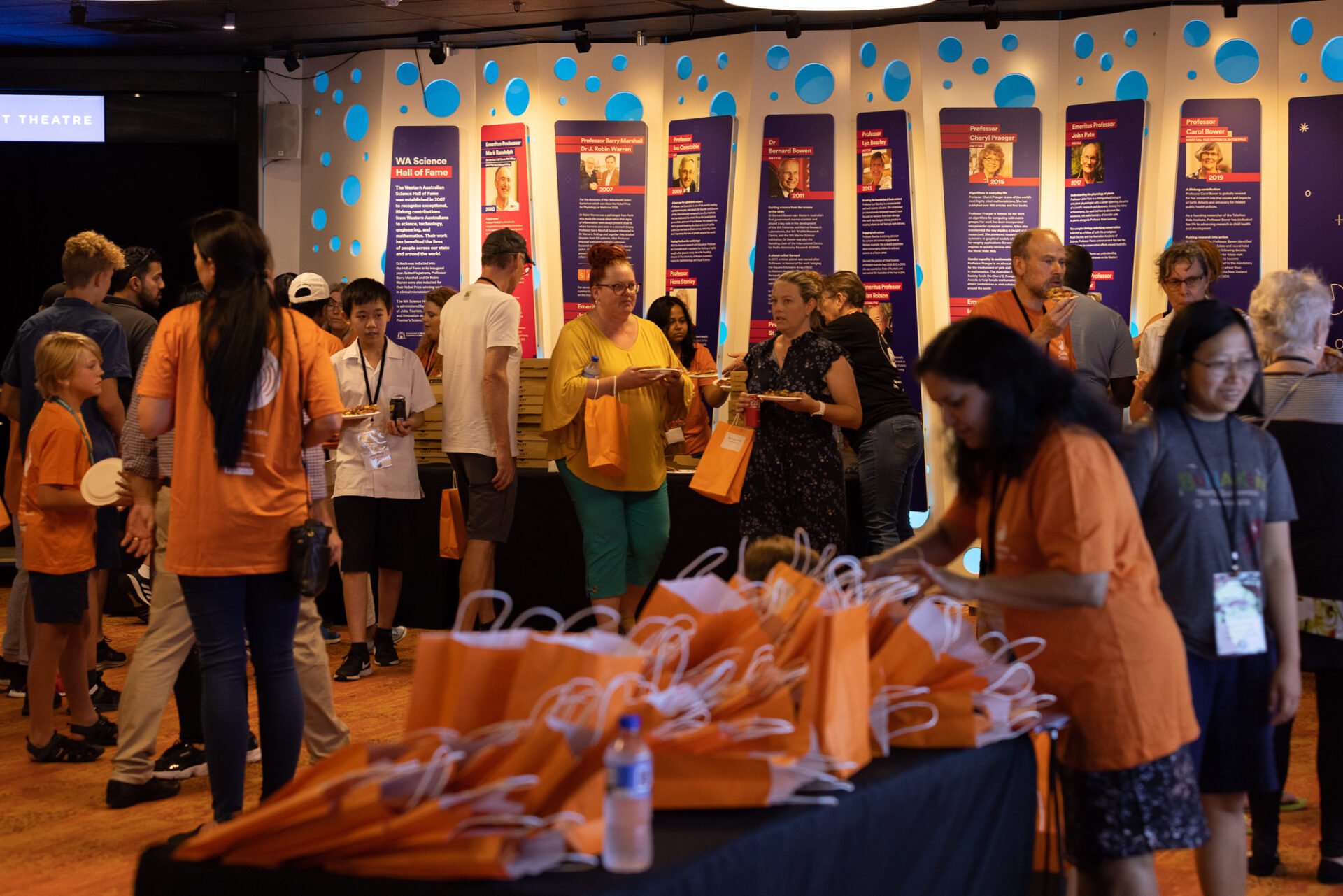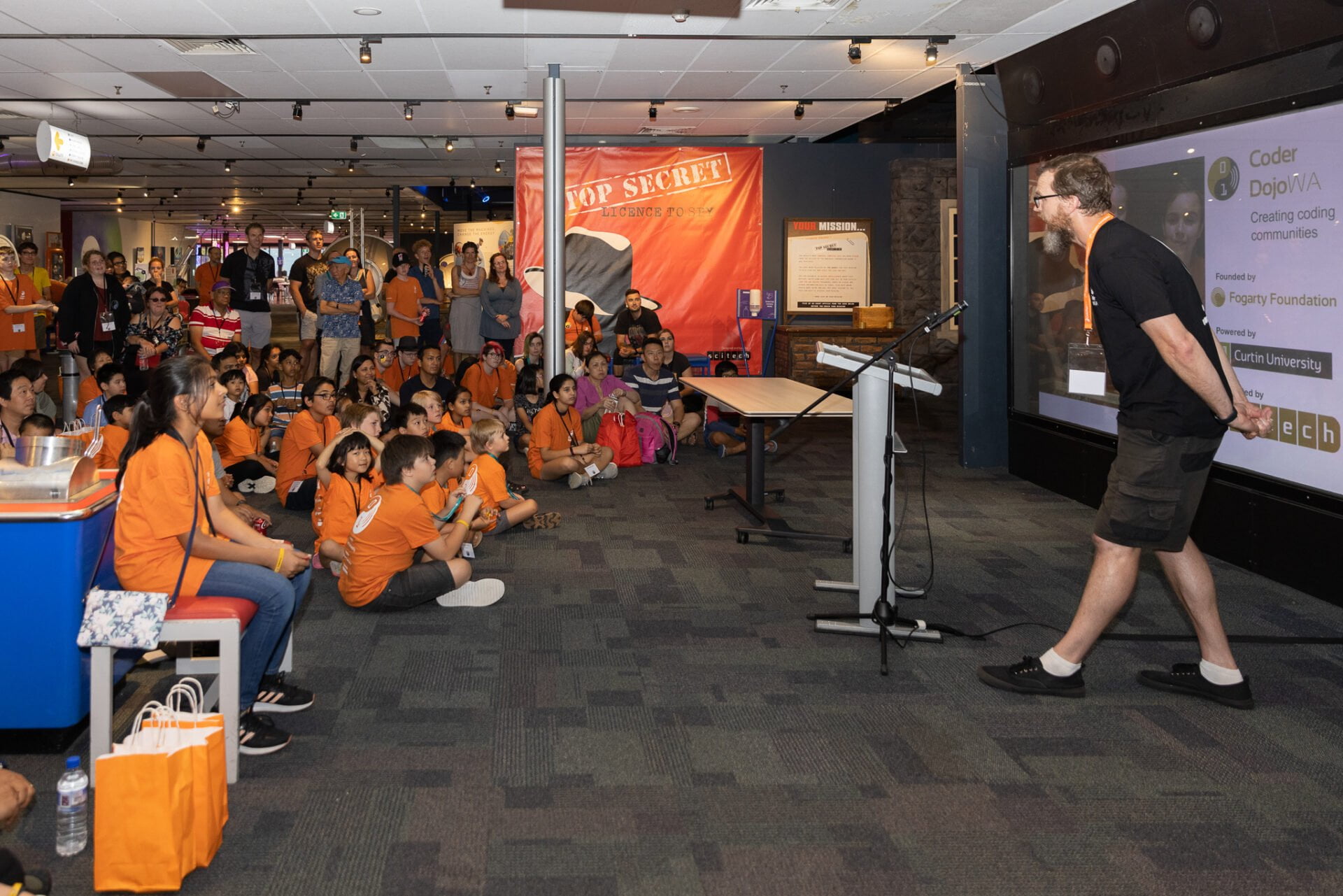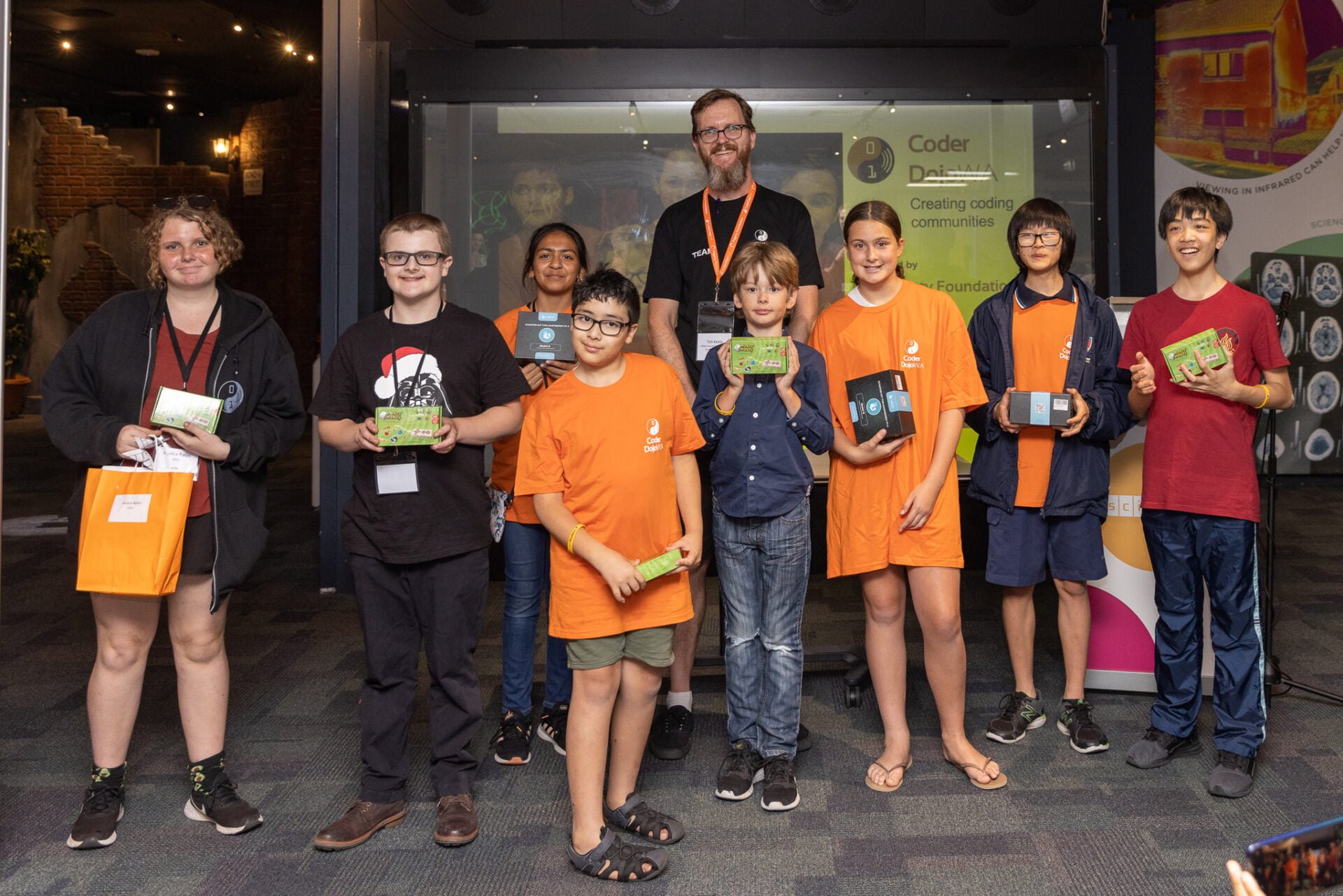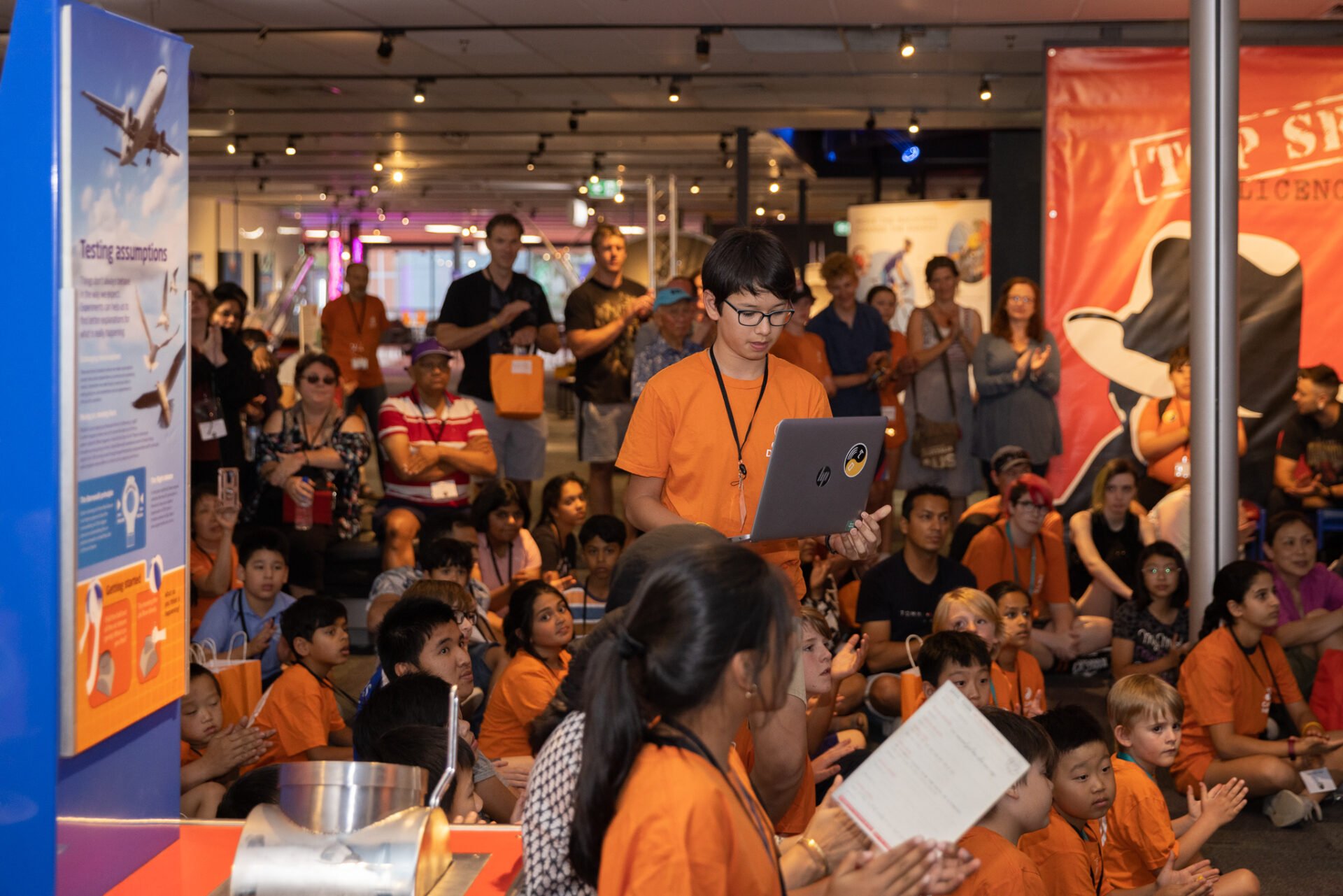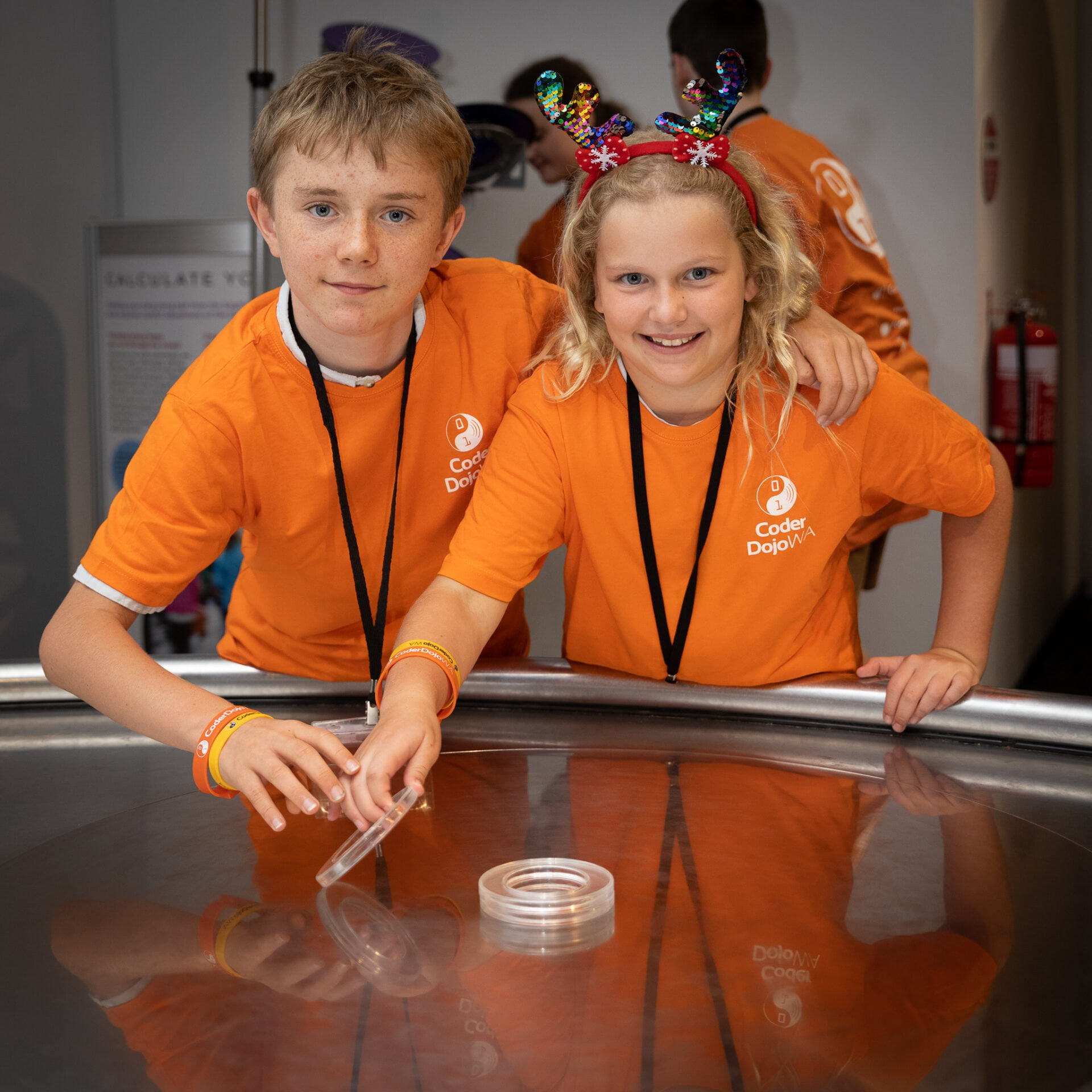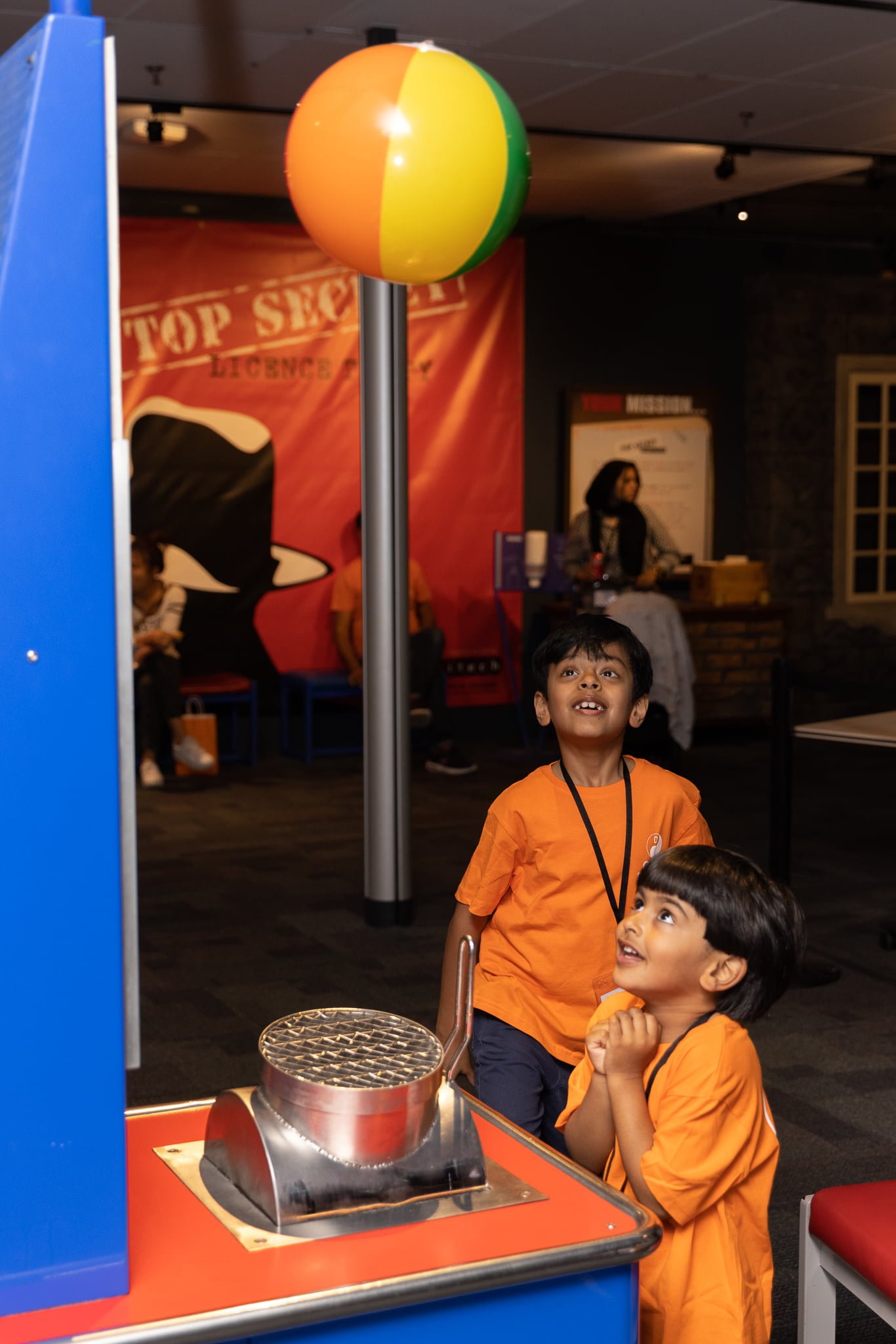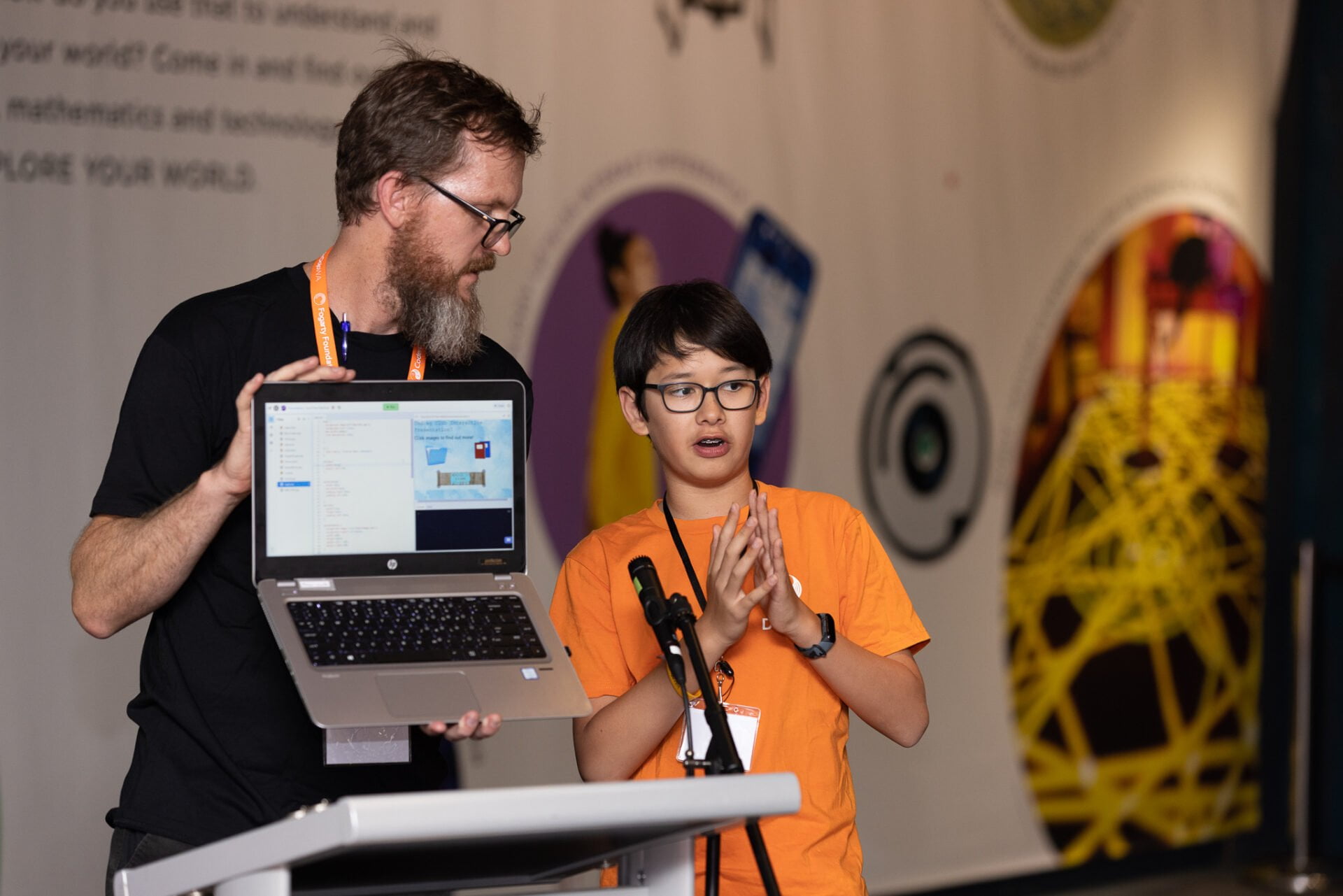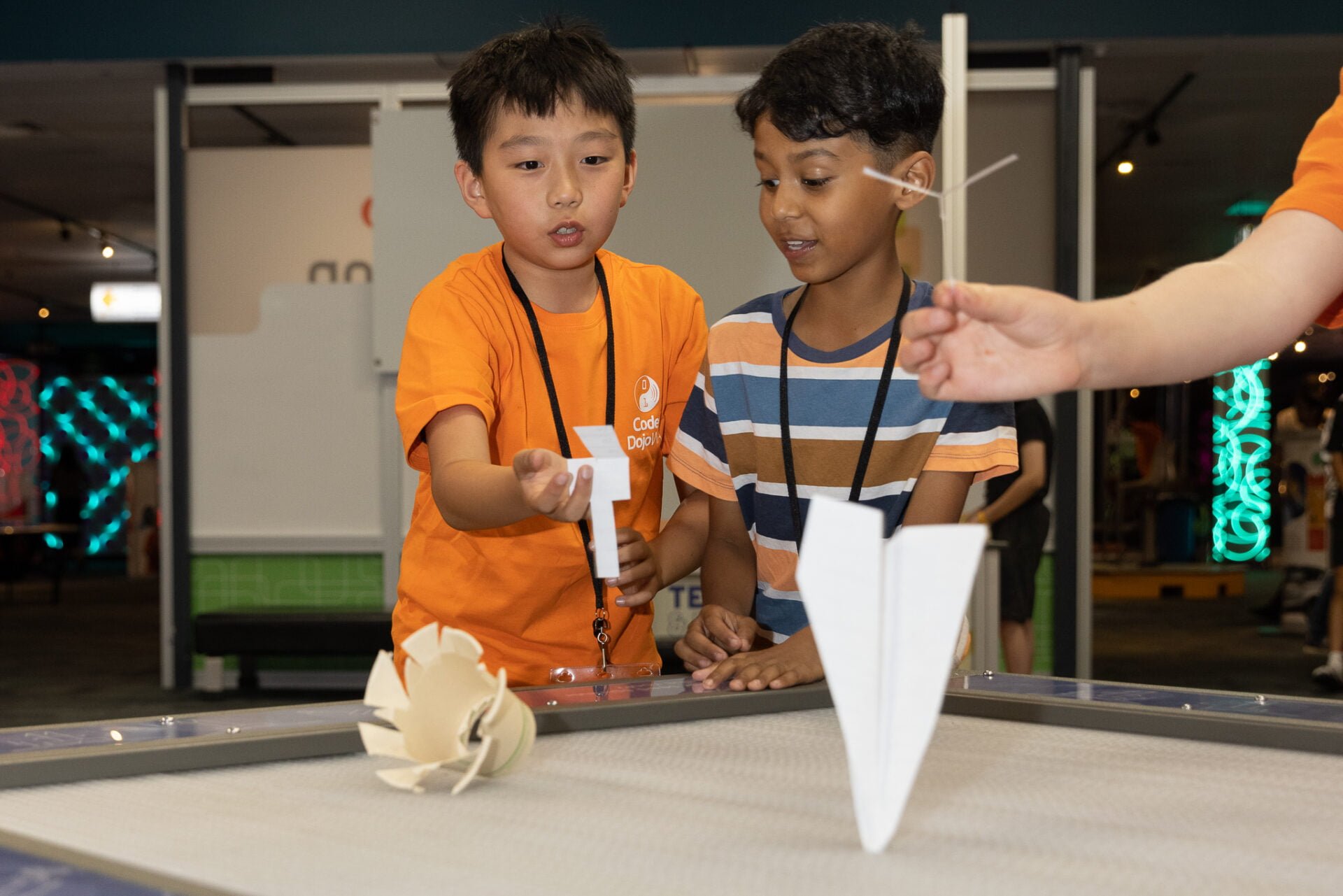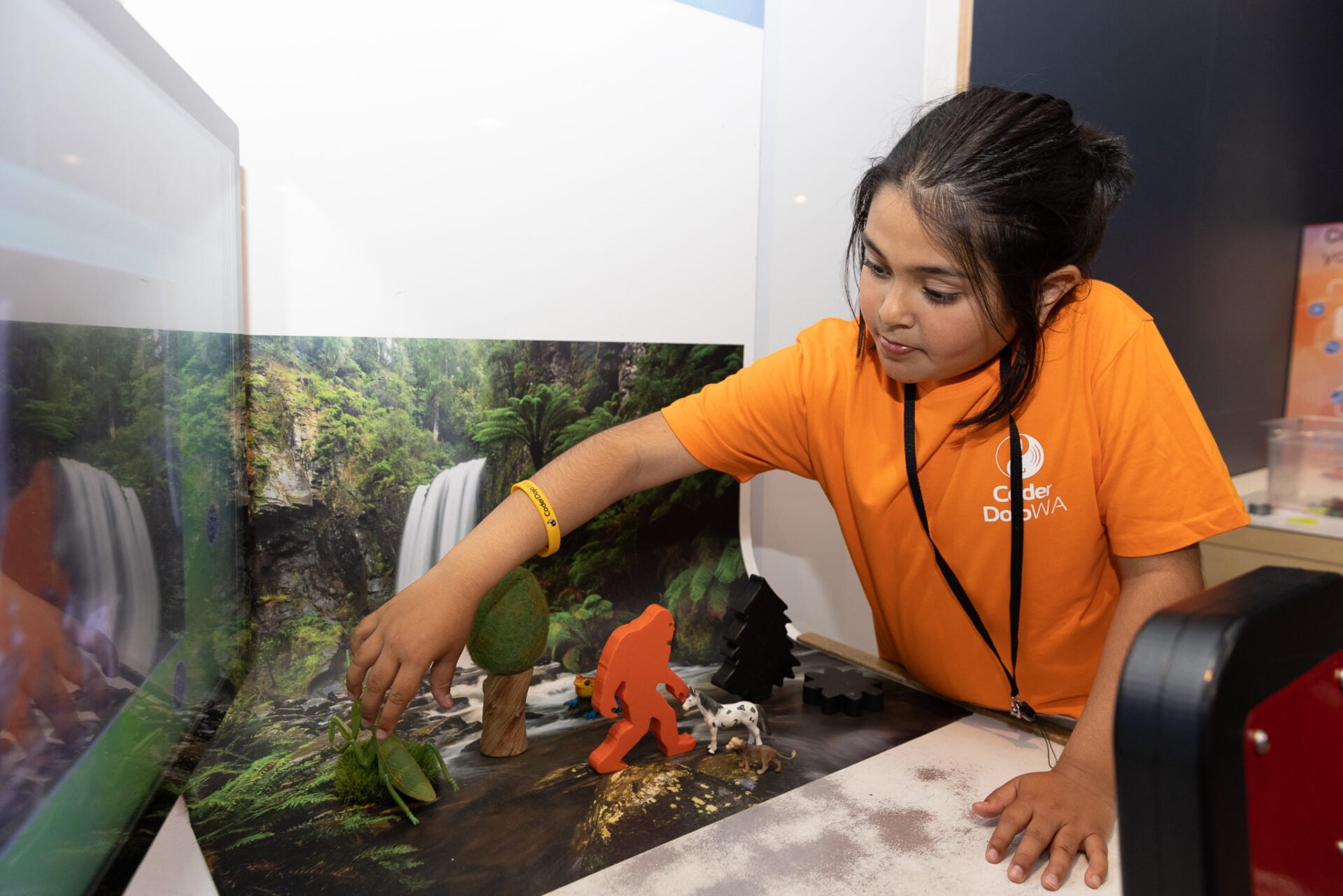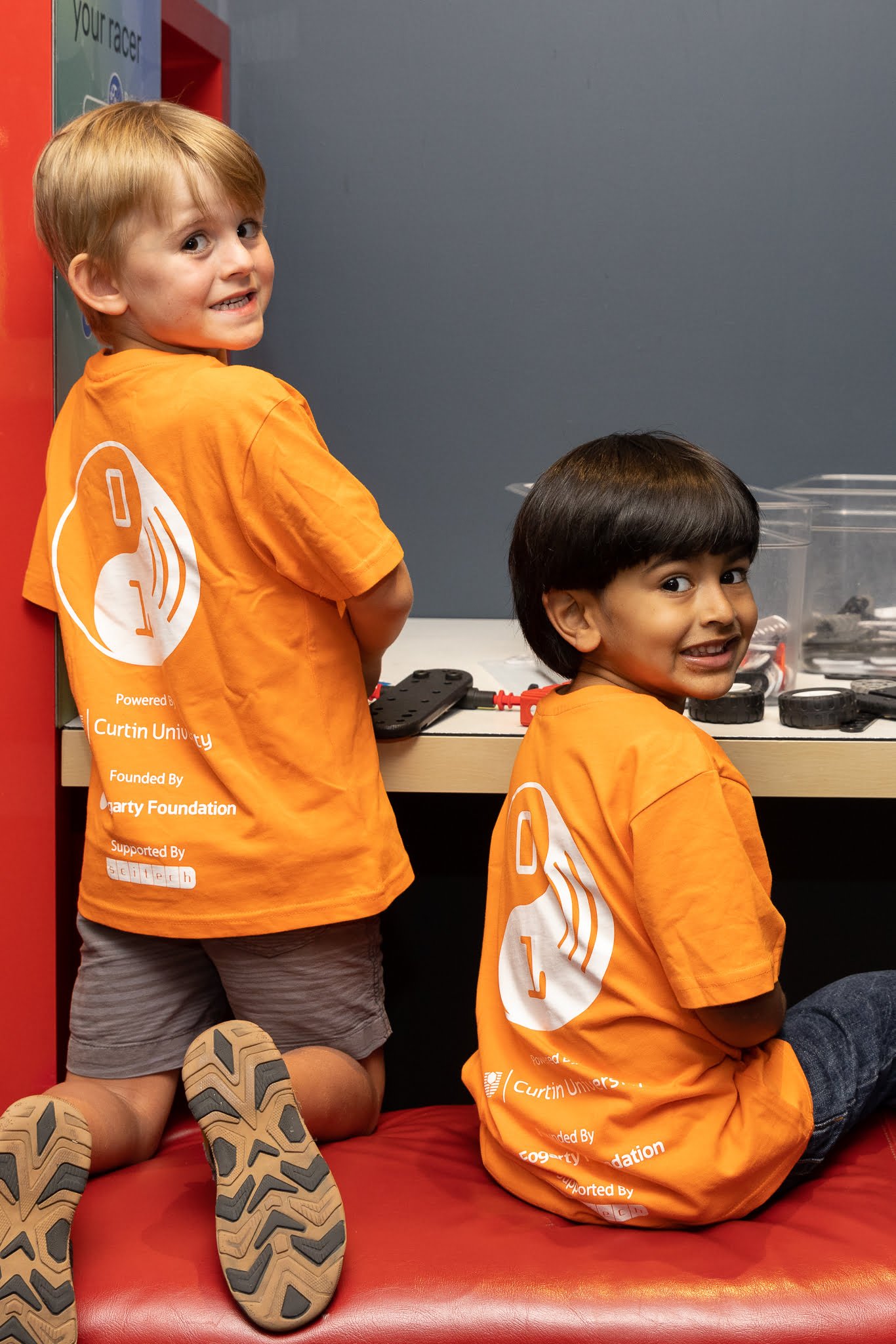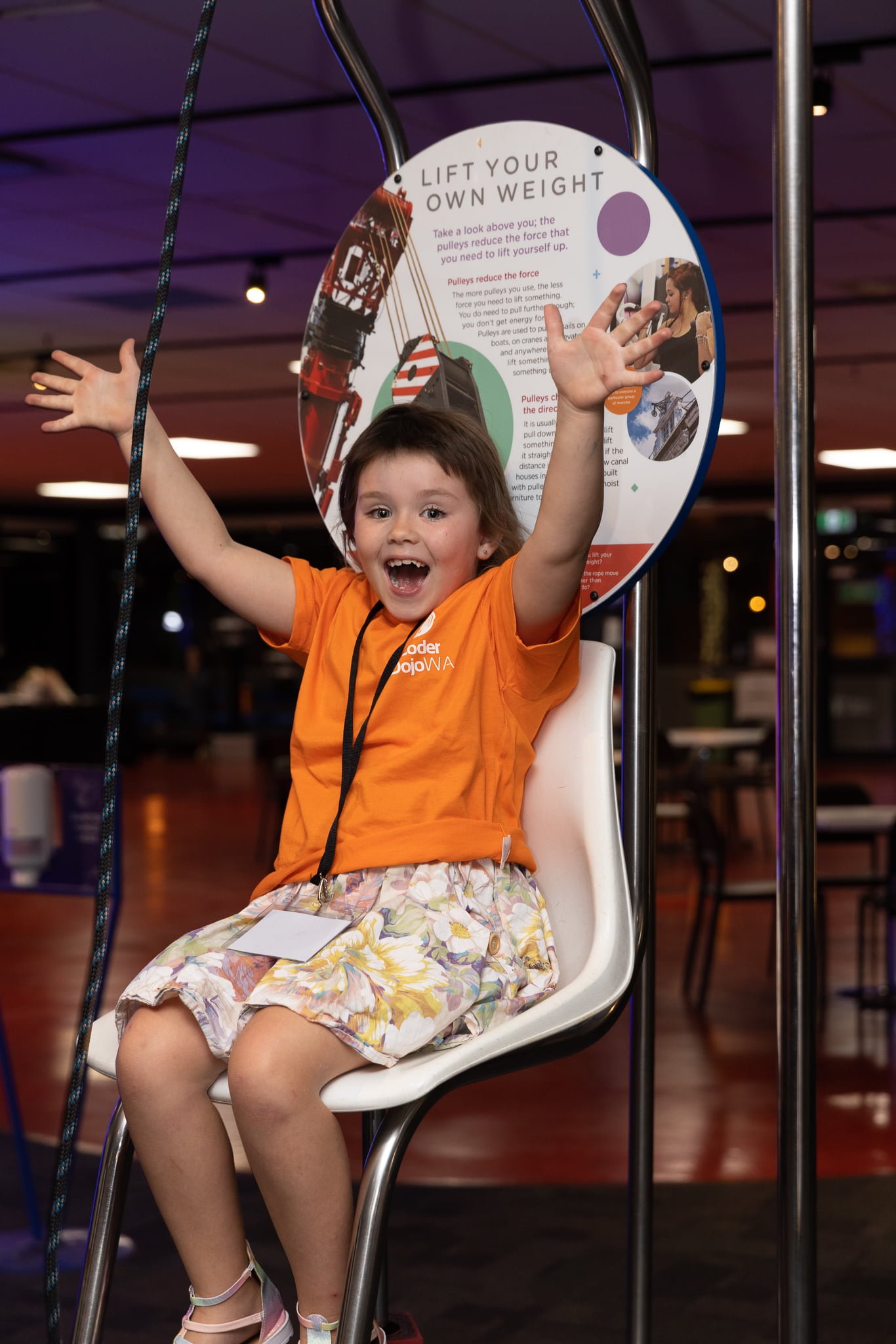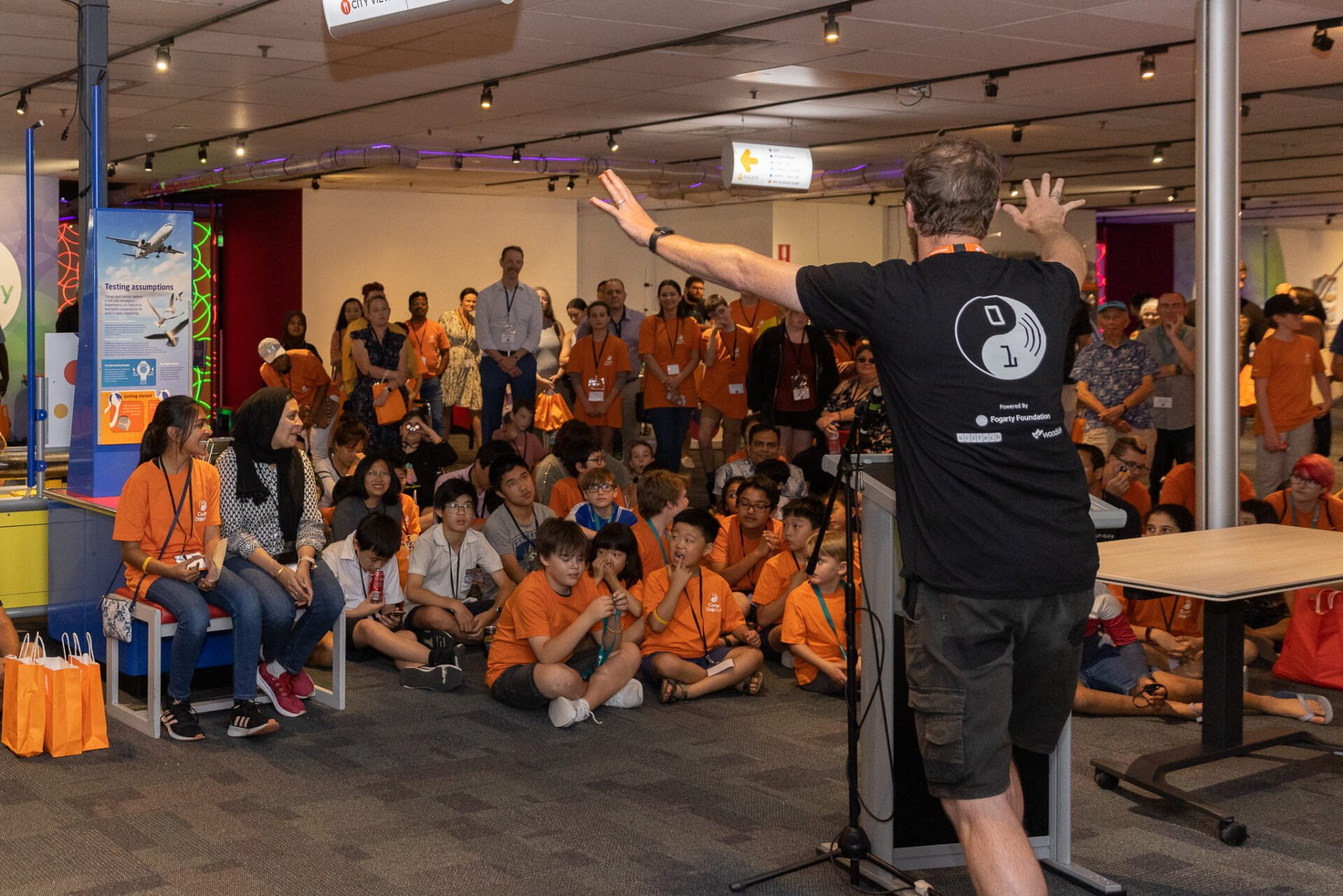CoderDojo WA End of Year PARTY
The CoderDojo WA community had a fabulous night celebrating another great year of coding last night. Ninjas, Mentors and Champions from around WA descended upon Scitech to share their ideas and innovative projects.
Ninjas shared stories about debugging, glitches and syntax errors, negotiating coding challenges and how they have such fun coding with their friends.
Annie Fogarty, Executive Chairperson of the Fogarty Foundation, thanked the CoderDojo WA community for their passion and enthusiasm before welcoming CoderDojo WA’s new partnership with Curtin University.
“Curtin University are a leading technology and future learning institute with a range of STEM programs that will grow the impact of CoderDojo WA going forward,” she said.
“Since the Fogarty Foundation started CoderDojo in Western Australia in 2008, there have been over 150 Dojos across the state, 300+ Champions, more than 600 Mentors and over 4,000 Ninjas coding and creating. We are thrilled to be working with Curtin University and look forward to an exciting and innovative partnership.”
Tim Keely, Curtin’s STEM Outreach Coordinator and new Manager of CoderDojo WA said he was really looking forward to working with the Ninjas, Mentors and Champions who make the coding world so much fun.
“Computing and digital technologies are a core part of Curtin’s DNA, so we are excited to join forces with the Fogarty Foundation to support the CoderDojo WA movement,” he said.
“Giving you, our coding community, the opportunity to explore your interests in computing is a rich and rewarding experience. You are the future of our coding world, and we can’t wait to see your innovations of the future.”
Professor Chris Rawson, Dean for the Faculty of Science and Engineering at Curtin University also welcomed the new partnership, before sharing his enthusiasm for the future of Science and Engineering in WA.
Thank you to the many volunteers who assisted throughout the evening. Once again, your help was invaluable and greatly appreciated by the CoderDojo WA community.
We look forward to another innovative and fun year of coding in 2022.
There is a new breed of ninjas in the north after Ashdale Secondary College launched CoderDojo North over the weekend. Thanks to Curtin University, Bankwest and the Autism Academy for Software Quality Assurance (AASQA), CoderDojo North is ready to motivate coding ninjas to be innovative creators of technology.
“It was great to see such a range of community partners coming together to start yet another Dojo in the community. The launch was attended by senior members across business, the AASQA academy and universities. Without this teamwork and band of volunteers, Dojos just wouldn’t exist!”
Simon Thuijs, Manager of CoderDojo WA.
Coding is a tool that lets you write your story with technology. It is how humans talk to machines and an increasingly important skill for current and future generations.
“In Australia today, 87% of jobs demand digital skills, so it’s really important that we equip our youngsters with knowledge about coding and computers. Already, Ninjas at current AASQA Dojos are being linked up with paid internships and then ongoing roles, going to show that employers are really looking for candidates with these skills.”
Simon Thuijs, Manager of CoderDojo WA.
CoderDojo North is dedicated to students with autism, working to build their strengths for future training and employment opportunities. At the Dojo (coding club), Ninjas (students aged 12-18) will work on code-related projects such as websites, apps, game development and more, with the support of volunteer Mentors from Edith Cowan University (ECU) and Curtin University
Lainey Bradley is Champion of CoderDojo North and mother to a child with Autism who has shone since he started coding.
“My son has been a part of CoderDojo WA since July 2017 and has exceled in his IT and coding skills. He knows what career path he would like to take and to have the support of Ashdale Secondary College, Professor Tan (AASQA) and Dr Cook (AASQA), I know that he will realise his dream job. At long last we, as parents, have hope for the future of our loved ones leaving school and going out into the community armed with the skills to be a success.”
Lainey Bradley, Champion of CoderDojo WA North
Attendees of this exciting launch included Hon Kerry Sanderson AC CVO (Ambassador for AASQA), Lyn Beazley AO (Ambassador for AASQA), Margaret Quirk MLA, Professor Arshad Omari (Vice-Chancellor ECU), Dr Tele Tan (AASQA director) and Dr David Cook (AASQA Advisory Board and ECU).
To find out more, contact Lainey.bradley@curtin.edu.au
Keep your Ninjas occupied these holidays while they work on their coding skills. Here’s a few holiday-themed coding activities to keep them entertained and engaged.
- 8 winter themed projects to keep the kids busy over the holidays. Although this list was first published in 2018 (and it’s not winter where we are!), it still highlights a great selection of eight coding activities for a range of abilities.
- Check out the awesome projects on the Futures Lab Youtube page. Our awesome Champion Jonathan has put together a range of instructional videos, game-maker tutorials and Scratch activities.
- Fun Parent-Child Summer Projects for Coders and Tech Junkies. This list promotes a couple of websites that provide step-by-step coding tutorials and games.
- Five easy coding projects to do with kids these holidays. The five activities outlined on this site are perfect for Ninjas aged 7 to 13. Check them out and have a go!
- Join these one-day online coding camps by Code4Fun in Australia. The one-day ‘camps’ are running from Jan 11 – 21st, with options for Scratch, Java or Python. Note there is a cost associated ($50).
- Wanting your Ninjas to unplug these holidays? Check out this paper-based coding activity where you need to solve the code to uncover the secret message.
Scitech was abuzz this week, as coding ninjas from around WA joined forces to showcase their work and celebrate another fun year within the CoderDojo WA community.
Presenters came from far and wide including Amherst Library, Rosalie Primary School, Beechboro Library, Alkimos Library and Falcon FabLab. They spoke about the fun they have when coding with their friends and the challenges they come across, such as solving debugging and syntax errors.
“I enjoy coding things to move and I enjoy attempting to make and understand code. It is a great challenge,” Dylan (Canningvale) commented.
“The coding is the easy part, it’s when you find a glitch going through all that code that is the challenge,” he said.
“I really enjoy coding because I love socialising with other like-minded coders sharing a common interest,” Thomas (Shenton Park) said.
“I really love making a quirky backstory to the things I create,” he added.
Scitech’s Rich Williams spoke about the long friendship the Fogarty Foundation, CoderDojo WA and Scitech have had, saying that Scitech was thrilled to host the CoderDojo WA community.
“What the Fogarty Foundation are doing, really aligns with what Scitech is all about,” Mr Williams said.
“Encouraging a passion for science, technology and life-long learning.
“2020 has shown us how important STEM subjects are. Epidemiologists, scientists, and those working in the technology space. Innovation at the forefront of quickly adapting to the needs of the community,” he said.
Ninjas displayed interactive games, LEGO EV3 robots, drones and more.
Annie Fogarty, Executive Chairperson of the Fogarty Foundation, thanked the CoderDojo WA community for their passion and enthusiasm before Simon Thuijs, Manager of CoderDojo WA, facilitated a Q&A with some young and innovative Ninjas.
“It is great to see so many young people passionate about technology,” Mr Thuijs said to the group.
“We are really proud of you: the innovative projects you have created and the communities you have built.
“You are the next generation of leaders in WA and we look forward to seeing the amazing work you do in the future,” he said.
Thank you to the many volunteers who assisted us throughout the evening, your help was invaluable and greatly appreciated by the CoderDojo WA community.
To have a thriving and prosperous community, we need young people to be enterprising so they can create long term, sustainable economic and social impact.
Through EDfutures, the Fogarty Foundation is creating initiatives to help enable these skills and develop entrepreneurial mindsets.
We need to energise a new generation who see entrepreneurialism not as something that a few people ‘do’ but rather as a way of working and thinking that underpins something that anyone can ‘be’.
Dave Sherwood, UWA Fogarty Scholar Alumni, is CEO and co-founder of BibliU, a London-based start-up spun out of the University of Oxford Innovation Fund and now supported by the Fogarty Scholars Enterprise Investment Program.
After completing a Bachelor of Science (Chemistry and Physics) at the University of Western Australia, Dave was awarded a Rhodes Scholarship and travelled to Oxford to study Politics, Philosophy and Economics.
Having established his entrepreneurial skills when founding Teach, Learn, Grow, Dave was ready for another challenge and began working on his current venture, BibliU.
BibliU is a modern eTextbook platform that integrates with library and university systems. It has distribution agreements with all major academic publishers including Pearson, Wiley and McGraw, and is currently used by 43 universities and more than 100,000 students.
In 2019, Dave and his BibliU co-founders were honoured on the Forbes 30 Under 30 Social Entrepreneurs list.
During a recent Q&A with the Fogarty Enterprise team, Dave shared his thoughts on the four components to successful enterprise and why he thinks individuals, organisations and companies should learn to take more risks.
You can see the full Q&A here.
We live in a rapidly changing and increasingly digital world. Technology dominates many industries and coding literacy is gradually becoming one of the most important skills for current and future generations to learn.
What is coding?
Coding is a tool that lets you write your story with technology. It’s how we talk to the machines that are increasingly woven into our lives. If you can code, you can communicate your ideas with a computer or a program so they can be brought to life in bigger, brighter and more creative ways. It allows you to create things like software, apps, websites and tools to analyse the world around us.
Why learn to code?
WA is risking a workforce that is under skilled and under-prepared for the future. The number of jobs available in digital industries is on the increase and a shortfall in skilled and ready for work graduates is predicted to create a ‘digital innovation bottleneck’ in Australian businesses. With a significant use of computer and tablet technologies in schools, particularly in Australia, it is important to make the distinction between technology consumers and technology creators. Rather than focusing exclusively on the use of available technology, WA needs people who can create new technologies using code.
How can CoderDojo WA help?
CoderDojo WA aims to provide young people with more opportunities to develop their digital literacy skills across the board, becoming creators and not just consumers of technology. By giving people the time to explore, design and create in a digital landscape, CoderDojo WA acts to overcome the challenges of engaging more youth in STEM (Science, Technology, Engineering and Mathematics), ensuring that Western Australia can take a leading role in the digital economy.
Whether you choose to pursue a career in technology or not, it is clear that in the digital economy every young person will benefit from some knowledge of coding.
CoderDojo is a world-wide social education movement oriented around running free computer coding clubs (Dojos) for young people aged 7-17 (Ninjas). At CoderDojo, Ninjas work on their own code-related projects such as websites, apps, game development and more, with the support of volunteer Mentors.
A Dojo is not a workshop or class, it is a club – a social environment in which young people can have fun learning to code. Ninjas support each other, with the additional assistance of Mentors. Within a school environment, your Ninjas are your students learning to code. Mentors could be more experienced or senior students who enjoy coding and your Champion could be the teacher-in-charge or an interested parent.
CoderDojo WA provides everything you need to start your Dojo, including:
- A network of WA volunteers who can help you start, run and mentor at a Dojo
- Free training sessions for mentors and champions
- An online community of over 1000 CoderDojo WA members.
- Links to coding related competitions and opportunities for young Australians
- Relevant news in the local Perth tech community
To start your Dojo or find out more about the CoderDojo WA community visit https://fogartyedfutures.org.au/what_we_do/coderdojo_wa/
Jonathan Durnford is the CoderDojo Champion for the dojos run out of Midland library, which were recently closed in keeping with current social restrictions. Understanding how important the human-connection aspect of CoderDojo is, Jonathan decided to move his dojo completely online, providing an opportunity for the Ninja’s to continue coding and connecting with others.
“I’ve been delighted with how we’ve managed to enable some measure of that human connection during this pandemic”.
Over the last few months coding clubs around with world have adapted to virtual dojo’s. Whilst some have chosen to run their sessions privately on platforms like Zoom or Twitch, Jonathan decided to host his dojo publicly via YouTube Live Stream, which allows you to interact with your audience with a live video feed and chat.
The use of a public platform like YouTube suited the ethos and audience of the Midland Library Dojo’s. Rather than taking bookings, they have always promoted a drop in, drop out culture, open to anyone who wants to attend, as and when it suits them. Utilising YouTube, made it easy for Jonathan to promote the virtual dojo and allowed him to open the sessions up to everyone.
The sessions are usually joined by another Perth based dojo, Falcon FabLab, and there is even a ninja who regularly tunes in from the United Kingdom, waking in the morning to attend the afternoon time slot here in Perth. Jonathan also chose YouTube as it is the most popular online platform with the age demographic of his Ninja’s, with the majority aged around 10-12.
The remote sessions are structured differently to normal dojos, more like a coding lesson, but still interactive and in real time. Unlike a regular YouTube tutorial which can be paused and started again, a live stream is continuous, which Jonathan has found encourages Ninja’s to examine their coding critically. Jonathan works through the lessons at a slower pace, allowing Ninja’s time to keep up with the steps.
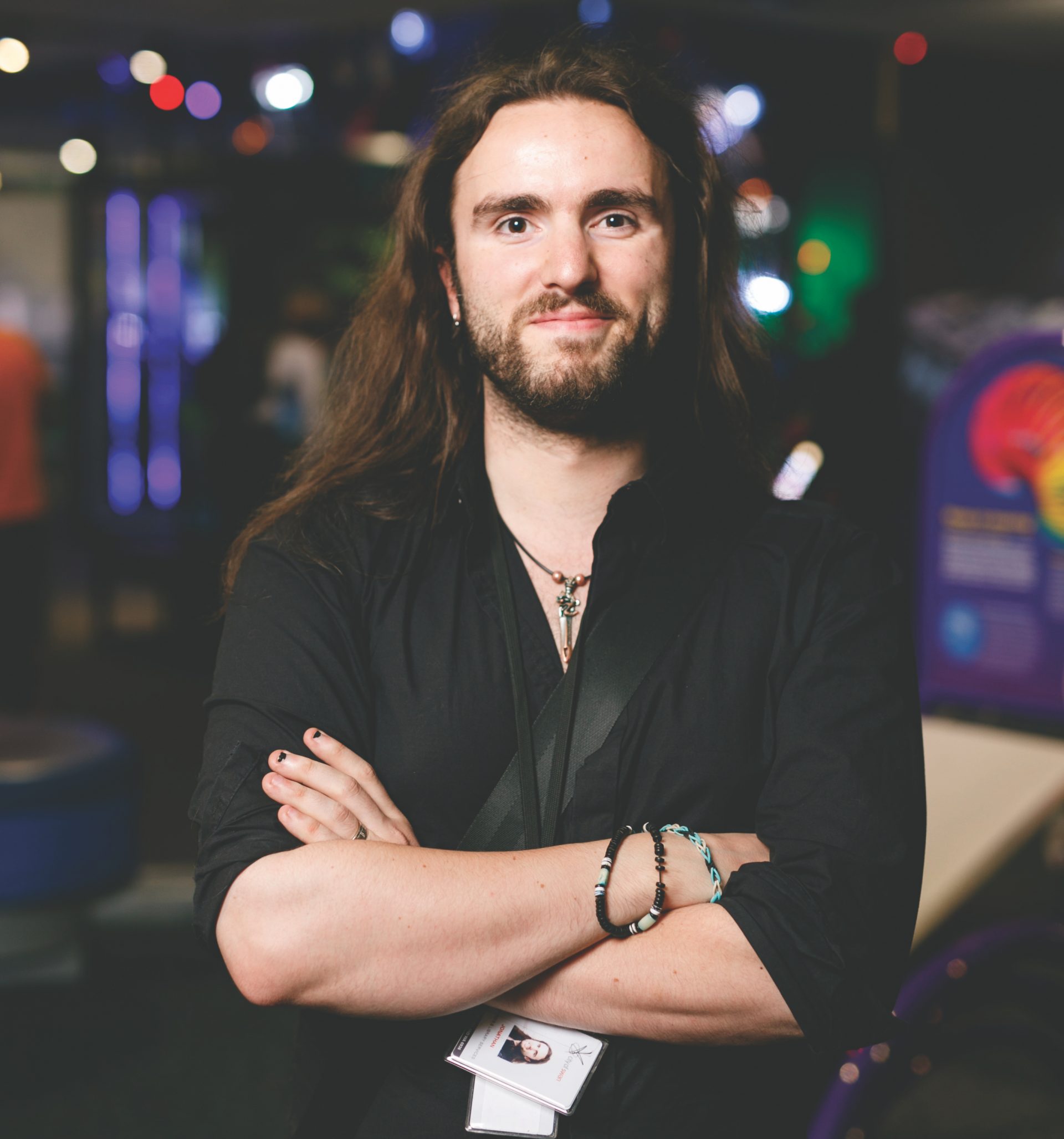
One of the biggest challenges he found was re-training the way Ninja’s receive feedback or assistance. Without being able to show Jonathan their screens as they would in a normal dojo, Ninja’s were encouraged to save and publish their projects to Scratch. By connecting with Ninja’s via their Scratch accounts, Jonathan is able to view their projects, bringing them up to the live stream screen and then working through the problem together as a collaborative team – a unexpected bonus which came out of running the sessions remotely.
In pre-COVID times, Jonathan ran three different dojos in three different locations. He kept the virtual dojo sessions segmented the same way, expecting everyone to join their usual dojo, but was surprised to find Ninja’s were tuning into all the sessions. This gave them an opportunity to connect with Ninja’s they haven’t met before. Jonathan found they quickly developed a great camaraderie amongst each other.
The online sessions receive good attendance each week, however Jonathan did notice a small decline in numbers as the weeks went on, which made it clear to him how much some Ninja’s rely on face-to-face interaction. Ninja’s who would normally never miss a regular dojo quickly realised they didn’t as much enjoy the virtual style of dojo. Jonathan found overall that the personal interaction of normal Dojo sessions is much more motivating.
“One thing I learnt is how many kids rely on face to face interaction and that is what makes the CoderDojo program so successful.”
From a champions perspective, Jonathan found the switch from facilitating a club to preparing coding lessons, to be surprisingly challenging. Used to hosting a very organic, ad-hoc CoderDojo without any kind of lesson plan, Jonathan found the prep-time involved in hosting live stream tutorials took longer than expected. But also said not to be afraid of getting it perfect. Live streams don’t need to be rehearsed or exact. It is better to just jump in, be open and talk through the process as you’re doing it.
Jonathan said an important aspect of going virtual is making Ninja’s feel welcome and part of the session. He suggested always being supportive of what the Ninja’s are doing and to remember that what works for one dojo, may not work for another.
“Find out what works for you. There’s no one correct way of doing it. It’s what works for you, what time you have, what resources you have and what your Ninja’s appreciate.”
Going forward, he hopes to continue utilising online methods, perhaps offering live streaming tutorials complementary to normal dojo sessions. With all of the live stream lessons recorded, Jonathan now has a library of recorded tutorials available for anyone to use at any time. The online lessons have even inspired some Ninjas to create their own video tutorials and You Tube channels, showing other young coders how to re-create their projects.
If you are interested in taking your dojo online, check out our guide to virtual dojos.
Calling all teachers, students, school leaders, policy makers, parents and other social change nerds!
The education system is a complex web of curriculum, data, reporting and administrative hamster wheels. As important as they can be, all these requirements can make it hard to see where there’s room for innovative approaches to education.
On the other hand, we know there are teachers, schools and students out there who are challenging the status quo with innovative learning – and they’re subject to the same rules and regulations as everyone else. We think the next question should be, what do they know that we don’t?
Join us for an honest discussion on innovation, impact and the future of the education system. Hear from Australia’s edu-rebels; connect with a network of innovator ninjas; and learn how you can get away with innovation in your own part of the education system.
- WHEN: October 21st 5-7pm
- WHERE: The Platform, 3/256 Adelaide Terrace, Perth
- ABOUT THE PANEL:
 Peter Hutton
Peter Hutton
CONVENOR, FUTURE SCHOOLS ALLIANCE
Peter is a maverick, a free radical, a challenger of the status quo. His strength is in transformational insight and supporting leaders to build innovative and adaptive cultures. Over an eight years journey, he transformed Templestowe College from a ‘broken’ school to one now recognised by Finland’s HundrED organisation as amongst the most innovative in the world. In 2018 he founded the Future Schools Alliance where member schools from across the country collaborate to develop new models of education that empower students to Take Control of their learning and prepare for times of exponential change.
Follow Peter @EdRev
 Jan Owen AM
Jan Owen AM
CEO FOUNDATION FOR YOUNG AUSTRALIANS
As CEO of the Foundation for Young Australians for the past 8 years, Jan has led the organisation’s strategic mission to equip young people to create, lead and thrive into the future. This focus has included ground-breaking research regarding the future of work and education for young Australians; the largest in-school entrepreneurship and youth social enterprise programs in the nation; and the development and launch of several new initiatives including YLab, FYA’s youth-led social enterprise.
Jan’s lifelong work and commitment to unleashing the talent of young people, driving social innovation and entrepreneurship, and transforming education has seen her recognised as one of Australia’s ‘True Leaders’ in 2018 and the Inaugural Australian Financial Review and Westpac ‘Woman of Influence’ in 2012.
Jan has been awarded honorary Doctorates from the University of Sydney and Murdoch University in Perth and membership to the Order of Australia in 2000 for services to the Australian community.
She is the author of Every Childhood Lasts a Lifetime (1996) and The Future Chasers (2014).
Follow Jan @JanOwenAM
 Prof. David Gibson
Prof. David Gibson
DIRECTOR LEARNING FUTURES
Professor David Gibson, Director of Learning Futures at Curtin University in Australia and UNESCO Chair of Data Science in Higher Education Learning and Teaching, received his doctorate (Ed.D. Leadership and Policy Studies) from the University of Vermont in 1999 based on a study of complex systems modeling of educational change. His foundational research demonstrated the feasibility of bridging from qualitative information to quantifiable dynamic relationships in complex models that verify trajectories of organizational change. He provides thought leadership as a researcher, professor, learning scientist and innovator. He is creator of simSchool, a classroom flight simulator for preparing educators, and eFolio an online performance-based assessment system, and provides vision and sponsorship for Curtin University’s Challenge, a mobile, game-based learning platform. He consults with project and system leaders, formulates strategies, and helps people articulate their vision for innovation; then helps connect people with the resources needed to fulfill their aspirations. His research has extended from learning analytics, complex systems analysis and modeling of education to application of complexity via games and simulations in teacher education, web applications and the future of learning. Dr. Gibson has also advanced the use of technology to personalize education via cognitive modeling, design and implementation.
 Esther Hill
Esther Hill
DIRECTOR, DJOOWAK: THE BEYOND BOUNDARIES INSTITUTE
Engaging teachers in conversations about pedagogy, the power of deep thinking and connected learning has been a driving force behind Esther Wilkes Hill’s school leadership. As Dean of Teaching and Learning at All Saints’ College, a leading Independent Anglican School in Perth, Western Australia, Esther strives to develop and support learning cultures where individual and group thinking is valued. As Director of Djoowak: The Beyond Boundaries Institute, Esther currently leads projects that focus on developing the capacities of students to be creative thinkers with an enterprising mindset that is focussed on problem finding and solution generating. At the core of this work is a deep commitment to the importance of teaching for understanding and making thinking visible: ideas that have been central to her work as a classroom teacher, curriculum leader and Director of Pedagogy and Professional Learning. Esther works to enable teachers across WA to access professional learning that empowers them to explore these ideas. She is passionate about developing the capacity of all teachers and learners to be innovators and thinkers who can create a better world.
Follow Esther @ThinkEsther
Adam Brookes 
TEACHER, MOTHER THERESA CATHOLIC COLLEGE
Passionate about cross-curricular, big-picture learning, Adam is a middle school teacher from Mother Teresa Catholic College who challenges the status quo in education. The evolution of the education system is always at the forefront of discussions, where you’ll often hear him using “how might we” questions to encourage other educators to think about doing ‘schooling’ differently. His catch-cry of “we are the system” is a call to empower all of us to be innovators in our own right and to drive system change from the ground up. Next year, in a new role as Team Leader – Inquiry and Innovation at Mother Teresa will see Adam continue the work already done at the College to build and develop the culture of learning for students and staff, particularly in inquiry learning.
Follow Adam @brookssensei
With school closures and a possible lockdown looming, we thought we would share some resources to keep you busy over the extended break. This could be a perfect time to tackle a big new project or perfect one you’ve been working on in your dojo. And with collaboration apps available like Slack and Zoom, there’s no reason you can’t stay connected with your fellow ninjas and friends and even work together on a project.
LEARN & PLAY
A lot of these resources blur the lines between play and learning, which is exactly why learning to code is so much fun. Some apps will teach a specific programming language, whilst others are more game based and teach logic and programming concepts. We’ve also thrown in a few other STEM resources to keep you busy.
Programming 101: An introduction to Python
This awesome course is ideal for anyone looking for a basic introduction to Python. You will explore basic programming concepts such as sequencing and repetition, produce your own program to solve a simple problem, and much more.
Scratch to Python: Moving from Block- to Text-based Programming
Most CoderDojo Ninjas begin their coding journey with Scratch, and the transition to text-based programming can be a challenge for some. With this course, you’ll explore how you can transfer programming and thinking skills from Scratch to Python. This course is perfect for CoderDojo volunteers, or parents of young people, who are looking to progress their learning at home. This is just one of the many amazing free courses provided by FutureLearn.
Swift Playgrounds
Swift is a powerful programming language created by Apple and used by the pros to build today’s most popular apps. In Swift Playground you solve puzzles to master the basics and then take on a series of challenges and step up to more advanced playgrounds. It requires no coding knowledge, so it’s perfect for students just starting out and available on iPad and Mac. It’s also super fun and playful.
Raspberry Pi
The Raspberry Pi website has a stack load of projects that will help you start writing code and get going with digital making. They also have a range of Big Projects which you can work on in a group.
Lynda.com
These courses on this site are suited to adults, but would also suit older teens that want to tackle more advanced programming. There is a cost involved with this one, but you can trial it free for month before committing.
DIY.org
DIY.org is more than just a resources website. It is a huge library of hands-on projects, how-to videos, and an awesome kid community. They have a humongous range of courses and challenges covering every imaginable topic and interest. There are a heap of amazing tech skills to learn like app development, game design and front end development, as well as an assortment of other amazing skills like entrepreneurship, entomology, cartooning and astronomy. They even teach fort building! Kids earn badges while they learn new skills, can share their projects, and interact with peers. There is a subscription cost involved with this one, but you can trial it free for a month.
Nasa SpacePlace
Explore Earth and Space with this awesome website by NASA. It’s packed full of awesome astro information in easy to read formats and also has heaps of fun games and space related activities. When you’re finished with that one, check out NASA Kids Club.
Nancy Drew: Code and Clue Mystery Coding Game
This is a fun story-based game that involves collecting evidence to solve a mystery and dragging visual code blocks into place. An excellent entry-level coding app for STEM development.
Cat meme generator
At times like these we need meme’s to lighten the mental load, which makes this Cat Meme Generator an essential resource right now.
Of course let’s not forget the clever folks at Scratch are always busy creating new projects to work on. Code.org is also jam-packed full of clever resources for all age groups as well as teachers. And most importantly, make sure you check out all the resources at CoderDojo international.
MOVIES
Ok yes, you’re right, movies do not technically qualify as resources. But we promise they are STEM based and sure to pique the curiosity of anyone with a love for tech. Perfect for those lazy afternoons or the Friday night family movie.
Wall E – If you haven’t met Wall E, you are missing out! A lone robot left on Earth, Wall-E spots a probe named EVE who has returned to Earth to scope things out, he falls in love and follows her back across the galaxy on an epic adventure.
Big Hero 6 – Another loveable robot features in this movie about a 14-year-old genius who invents special microbots to join his brother’s university robotics program. After tragedy ensues, a group of heroes unites and uses their strengths in chemistry and engineering to overtake a crafty villain.
Dream Big: Engineering Our World – This documentary highlights engineers from various backgrounds and the projects they’re designing, from earthquake-proof structures to footbridges in developing countries.
War Games – All the retro feels here with this 80’s classic. In WarGames, a high school student accidentally hacks into a military computer that controls nuclear arms while looking for new video games online. . .and almost sets off World War III. It’s up to him to convince the government that he was the one who simulated a Soviet attack.
SHARE YOUR FAVOURITE RESOURCES…
Have you discovered any resources that you think we’d like? We’re always on the look out for great new learning platforms, coding games, or any other STEM related awesome-ness. Be sure to share anything you find with us via email at CoderDojo WA or on our Facebook page. And we especially LOVE seeing any projects or games you have been working on, so please email them to us and we can share them with the CoderDojo WA community.
